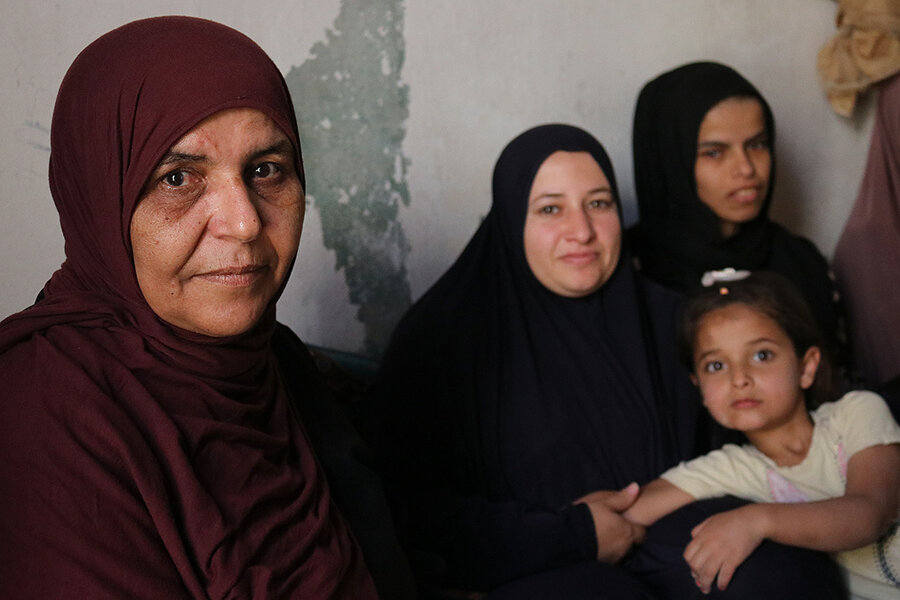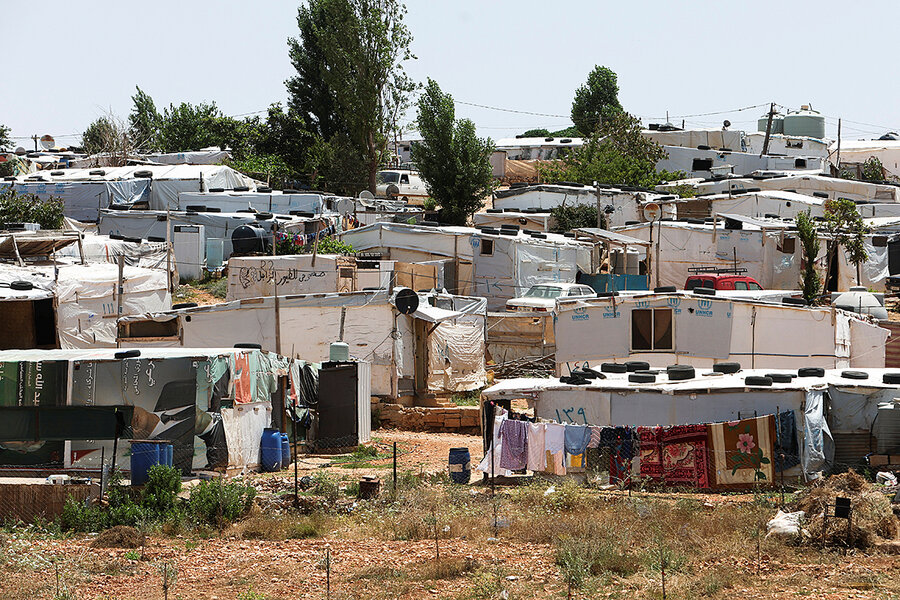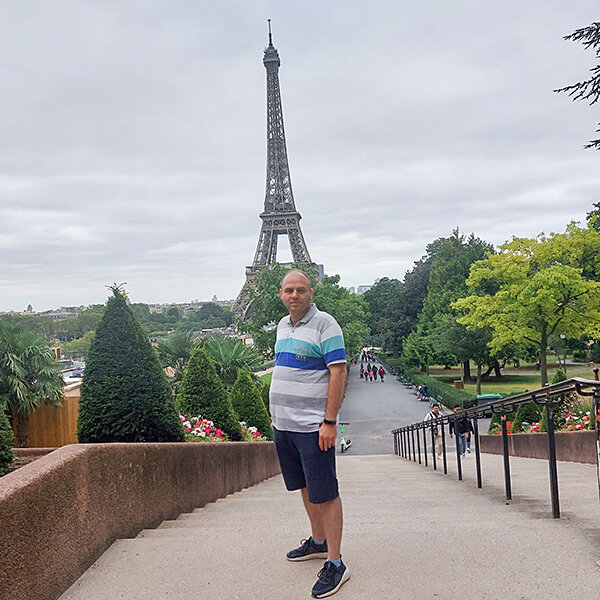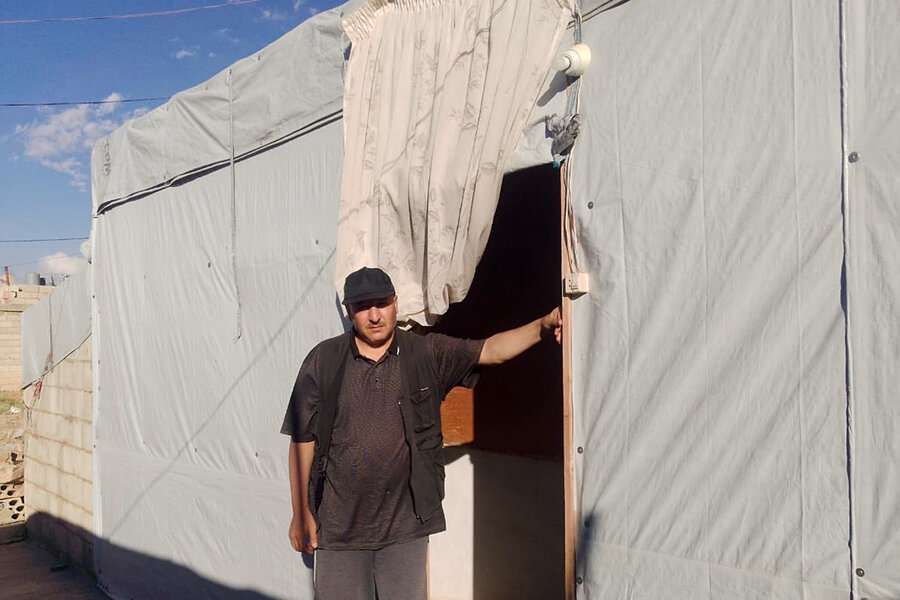
|
By Taylor Luck Special correspondent
Dominique Soguel Special correspondent
CHRISTIAN SCIENCE MONITOR
June 27, 2023|RAMTHA, JORDAN; AND BASEL, SWITZERLAND
Some mornings Bassam al-Masri walks to a farm at the edge of Jordan’s northern border town of Ramtha and looks across the Yarmuk River valley into Syria. On a clear day, he can see the mosque where he preached and the remains of his house in Daraa 7 miles away.
Although the Syrian refugee could walk to his hometown in two hours, it remains, for him, as unreachable as ever – no matter the recent reconciliation between Arab states and President Bashar al-Assad’s regime and the resulting promises of safe returns.
“The only guarantee that we could return safely is for Assad to go,” says Mr. Masri, among millions of Syrians living in the Middle East and Europe who long to return home but fear they cannot. “As long as he is present, we are permanently separated from our homeland. He cannot be trusted.”
WHY WE WROTE THIS

Aziz Taher/ReutersView
“It is a massive disappointment for most Syrians living in or outside Syria,” France-based Syrian journalist Samir Tawil says of the diplomatic move. “It’s like the Syrian regime won against the Syrian people, against the Arab world, and against the whole world. But the biggest loser is the Syrian people.”
Present at the beginning
Mr. Masri is intimately familiar with the Assad regime’s record. Daraa’s historic Al-Omari Mosque, where he preached, was a flashpoint for the first protests that erupted in the town in March 2011 over the arrest and torture of 15 teenagers who spray-painted graffiti demanding Mr. Assad’s overthrow.
Police killings of Daraa protesters would spark nationwide peaceful demonstrations – part of the regionwide Arab Spring – that eventually escalated into civil war.
In those first days, Mr. Masri worked with local officials and security services to soothe tensions and reach a peaceful solution. He preached to his flock not to protest. For his troubles, he was tortured and disfigured by regime security services, losing a kidney.
“You can’t believe this regime’s promises or reason with them because they know no way other than oppression and violence. Trust me, I’ve tried,” Mr. Masri says from his Ramtha apartment.

Taylor LuckView caption
With Arab states’ embrace of Mr. Assad, Mr. Masri and many Syrians believe that the dictator feels “protected and promoted,” with no incentive to take responsibility or reconcile with opponents.
“If the Assad regime had any intention to reconcile or offer a guarantee to make us feel safe to return, it could at least tell us the fate of the thousands of our relatives missing in its prisons,” he says. “At the very least tell us who is alive and who is dead so that we can begin to mourn and heal.”
Mr. Tawil, who obtained asylum in Paris in 2016, is also well-versed in the Assad regime’s trustworthiness.
Working for Syrian state television when the revolution erupted, he witnessed his neighborhood cemetery fill with the corpses of peaceful demonstrators while the channel claimed the security forces were battling armed terrorists.
That was one reason he left the country. Helicopter attacks on his neighborhood were another.
“We left as refugees fleeing death,” he says. “There is no guarantee possible that would return us to death. As long as the Assad and intelligence service apparatus remains in place, there is no return possible.”

Photo Courtesy of Samir Tawil

Photo Courtesy of Ahmed Abu Omar
A political transition and the reconstruction of the country are necessary conditions for his return. A personal obstacle is reclaiming his partially destroyed home – the section still standing is now occupied by fellow Syrians who refuse to vacate and falsely accuse him of rebel activity.
“We were waiting impatiently for the Arab summit in Saudi Arabia,” he shares. “We thought step-by-step things will move forward, but until now, nothing has happened. There has been no release of the detainees. ... Half of Syria is displaced. There’s been no goodwill-building measures. It’s like nothing happened. It’s as if the whole thing gave Assad power.”
Most Syrians in Lebanon feel pressure to leave the country, he says. In a country still reeling with economic crisis and looking for scapegoats, the refugees are subjected to restrictions on their economic participation as well as political rants by sectarian leaders.
But the refugees are frightened of what would await them, he says, particularly the pro-regime gunmen, or shabiha. “The shabiha do whatever they want,” he says, “they are accountable to no one.”
Soheib Ahmed el-Abdu, a chef-turned-humanitarian activist, agrees. “The [pro-Assad] militias will settle scores with any members of the opposition so the situation is not safe, even if there was a political transition,” he says.
Returning, and disappearing
Concerns for the fate of returnees are shared in northern Jordan, where reports of activists going missing as soon as they cross the border have heightened insecurity among the refugees. The border town of Ramtha is awash with stories of friends, relatives, and neighbors who voluntarily returned to Syria – and were never heard from again.
Family members tell the Monitor of missing brothers and cousins who returned to Syria, showing WhatsApp conversations with returnees that abruptly stop, mobile phones disconnected.
The disappeared include one of the first Syrians who crossed back during a grand reopening of the Jordan-Syrian border in October 2018. After he was interviewed by Syrian state television and given sweets by Syrian officials who hugged him as a “lost brother,” he disappeared. He later reemerged in a regime prison where he reportedly remains today.
Unlike Jordan, Lebanon is home to many political players close to Mr. Assad and in favor of sending Syrians back, and there are recent reports that hundreds of refugees had been forcibly repatriated. In April, Human Rights Watch and Amnesty International issued a joint statement urging the Lebanese army to stop the summary deportations.
“There are raids and Syrians are being thrown on the other side of the border,” says Mr. Abdu, the activist. “The returns are being carried out in a militia or mafia style, not through political or diplomatic channels.
“Those who were returned, no one knows what became of them,” he says. “Were they detained? Did they get beaten? Nobody knows.”
June 27, 2023|RAMTHA, JORDAN; AND BASEL, SWITZERLAND
Some mornings Bassam al-Masri walks to a farm at the edge of Jordan’s northern border town of Ramtha and looks across the Yarmuk River valley into Syria. On a clear day, he can see the mosque where he preached and the remains of his house in Daraa 7 miles away.
Although the Syrian refugee could walk to his hometown in two hours, it remains, for him, as unreachable as ever – no matter the recent reconciliation between Arab states and President Bashar al-Assad’s regime and the resulting promises of safe returns.
“The only guarantee that we could return safely is for Assad to go,” says Mr. Masri, among millions of Syrians living in the Middle East and Europe who long to return home but fear they cannot. “As long as he is present, we are permanently separated from our homeland. He cannot be trusted.”
WHY WE WROTE THIS
A story focused on TRUST
After the Arab League reinstated Syria, some Syrian refugees had dared hope for measures to enable their return home. But in interviews and polls, most say they’ve seen nothing that convinces them that now is the time.
In interviews and polls, Syrian refugees say they have seen nothing that convinces them to trust Mr. Assad in the wake of the Arab League’s early May decision to reinstate Syria.
Syria’s membership had been suspended in 2011 following Mr. Assad’s brutal crackdown on dissent in the early days of Syria’s civil war, a conflict that left hundreds of thousands dead and millions displaced. And a few refugees had dared hope that the Arab world reconciliation would be followed by concrete measures to rebuild trust.
After the Arab League reinstated Syria, some Syrian refugees had dared hope for measures to enable their return home. But in interviews and polls, most say they’ve seen nothing that convinces them that now is the time.
In interviews and polls, Syrian refugees say they have seen nothing that convinces them to trust Mr. Assad in the wake of the Arab League’s early May decision to reinstate Syria.
Syria’s membership had been suspended in 2011 following Mr. Assad’s brutal crackdown on dissent in the early days of Syria’s civil war, a conflict that left hundreds of thousands dead and millions displaced. And a few refugees had dared hope that the Arab world reconciliation would be followed by concrete measures to rebuild trust.

Aziz Taher/ReutersView
But so far not even the “bare minimums” that they would expect are on the table: a general amnesty, reconciliation, transparency on the fate of the missing, and guarantees of a safe return for those who fled.
Without such measures, the vast majority of Syrians in exile say returning home is impossible: Any guarantee by Mr. Assad – regarded as a serial promise-breaker who has shown no contrition for the systematic destruction, torture, and killings under his command – cannot be trusted.
For Syrians whose lives have been upended by war, seeing Mr. Assad invited to events such as COP28, to be held in early December in Dubai, is a shock.
Without such measures, the vast majority of Syrians in exile say returning home is impossible: Any guarantee by Mr. Assad – regarded as a serial promise-breaker who has shown no contrition for the systematic destruction, torture, and killings under his command – cannot be trusted.
For Syrians whose lives have been upended by war, seeing Mr. Assad invited to events such as COP28, to be held in early December in Dubai, is a shock.
“It is a massive disappointment for most Syrians living in or outside Syria,” France-based Syrian journalist Samir Tawil says of the diplomatic move. “It’s like the Syrian regime won against the Syrian people, against the Arab world, and against the whole world. But the biggest loser is the Syrian people.”
Present at the beginning
Mr. Masri is intimately familiar with the Assad regime’s record. Daraa’s historic Al-Omari Mosque, where he preached, was a flashpoint for the first protests that erupted in the town in March 2011 over the arrest and torture of 15 teenagers who spray-painted graffiti demanding Mr. Assad’s overthrow.
Police killings of Daraa protesters would spark nationwide peaceful demonstrations – part of the regionwide Arab Spring – that eventually escalated into civil war.
In those first days, Mr. Masri worked with local officials and security services to soothe tensions and reach a peaceful solution. He preached to his flock not to protest. For his troubles, he was tortured and disfigured by regime security services, losing a kidney.
“You can’t believe this regime’s promises or reason with them because they know no way other than oppression and violence. Trust me, I’ve tried,” Mr. Masri says from his Ramtha apartment.

Taylor LuckView caption
With Arab states’ embrace of Mr. Assad, Mr. Masri and many Syrians believe that the dictator feels “protected and promoted,” with no incentive to take responsibility or reconcile with opponents.
“If the Assad regime had any intention to reconcile or offer a guarantee to make us feel safe to return, it could at least tell us the fate of the thousands of our relatives missing in its prisons,” he says. “At the very least tell us who is alive and who is dead so that we can begin to mourn and heal.”
Mr. Tawil, who obtained asylum in Paris in 2016, is also well-versed in the Assad regime’s trustworthiness.
Working for Syrian state television when the revolution erupted, he witnessed his neighborhood cemetery fill with the corpses of peaceful demonstrators while the channel claimed the security forces were battling armed terrorists.
That was one reason he left the country. Helicopter attacks on his neighborhood were another.
“We left as refugees fleeing death,” he says. “There is no guarantee possible that would return us to death. As long as the Assad and intelligence service apparatus remains in place, there is no return possible.”

Photo Courtesy of Samir Tawil
Fear of reprisals
A large majority of Syrian refugees in neighboring states rule out returning, despite facing increasingly dire economic straits. Dwindling humanitarian aid, a shift in international assistance to Ukraine, and post-COVID global inflation complicate their survival. Yet even if they wanted, many would have no home to return to, as war has reduced many areas to rubble.
Many point out that mistrust extends beyond the Assad regime. With Syrian families and neighbors divided by rival armies, militias, and proxy groups, some fear lingering violence as well as reprisal attacks from fellow Syrians seeking to settle old scores.
Shamseh Mustafa has lived in the Jordanian border town of Mafraq with her seven children and extended family since they fled their village outside Aleppo in 2012. When a United Nations funding shortfall earlier this year caused a three-month pause in their rental assistance, her family of 12 was evicted from their apartment. Now they share a rented, bare, 12-foot-by-6-foot room.
With no money for transportation, her two eldest daughters, Baraa, 18, and Israa, 16, and her 8-year-old nephew Ahmed dropped out of school this spring.
The family is in debt and struggles to pay the electricity bill. Still, a return to Ms. Mustafa’s abandoned 2-acre farm and bombed-out house in Syria “is out of the question.”
“We can’t even say the word ‘return.’ There is no safety, no economy, no trust in Syria. There is nothing to return to,” she says. “Even if a miracle from God brought peace and turned Syria into a paradise, what will cleanse the hatred that has been planted in people’s hearts?
“Can you sleep at night knowing that a relative or stranger may come and kill you to settle an old score?” she says. “Bad blood like that cannot cleanse.”
Lebanese pressure
Syrian farmer Ahmed Abu Omar moved with his wife and six children into a plastic tent in Lebanon’s Arsal camp in 2012. The summers have been hot, winters cold. Dependent on humanitarian aid, the family can only afford meat three times a year. Their diet is heavy on rice and pickled goods. The bulk of the budget is taken up by $20 per month rent for the land beneath their tent.
“If we could go back in a dignified and safe way, we would go back,” says Abu Omar, who declined to include his last name for safety reasons.
A large majority of Syrian refugees in neighboring states rule out returning, despite facing increasingly dire economic straits. Dwindling humanitarian aid, a shift in international assistance to Ukraine, and post-COVID global inflation complicate their survival. Yet even if they wanted, many would have no home to return to, as war has reduced many areas to rubble.
Many point out that mistrust extends beyond the Assad regime. With Syrian families and neighbors divided by rival armies, militias, and proxy groups, some fear lingering violence as well as reprisal attacks from fellow Syrians seeking to settle old scores.
Shamseh Mustafa has lived in the Jordanian border town of Mafraq with her seven children and extended family since they fled their village outside Aleppo in 2012. When a United Nations funding shortfall earlier this year caused a three-month pause in their rental assistance, her family of 12 was evicted from their apartment. Now they share a rented, bare, 12-foot-by-6-foot room.
With no money for transportation, her two eldest daughters, Baraa, 18, and Israa, 16, and her 8-year-old nephew Ahmed dropped out of school this spring.
The family is in debt and struggles to pay the electricity bill. Still, a return to Ms. Mustafa’s abandoned 2-acre farm and bombed-out house in Syria “is out of the question.”
“We can’t even say the word ‘return.’ There is no safety, no economy, no trust in Syria. There is nothing to return to,” she says. “Even if a miracle from God brought peace and turned Syria into a paradise, what will cleanse the hatred that has been planted in people’s hearts?
“Can you sleep at night knowing that a relative or stranger may come and kill you to settle an old score?” she says. “Bad blood like that cannot cleanse.”
Lebanese pressure
Syrian farmer Ahmed Abu Omar moved with his wife and six children into a plastic tent in Lebanon’s Arsal camp in 2012. The summers have been hot, winters cold. Dependent on humanitarian aid, the family can only afford meat three times a year. Their diet is heavy on rice and pickled goods. The bulk of the budget is taken up by $20 per month rent for the land beneath their tent.
“If we could go back in a dignified and safe way, we would go back,” says Abu Omar, who declined to include his last name for safety reasons.

Photo Courtesy of Ahmed Abu Omar
A political transition and the reconstruction of the country are necessary conditions for his return. A personal obstacle is reclaiming his partially destroyed home – the section still standing is now occupied by fellow Syrians who refuse to vacate and falsely accuse him of rebel activity.
“We were waiting impatiently for the Arab summit in Saudi Arabia,” he shares. “We thought step-by-step things will move forward, but until now, nothing has happened. There has been no release of the detainees. ... Half of Syria is displaced. There’s been no goodwill-building measures. It’s like nothing happened. It’s as if the whole thing gave Assad power.”
Most Syrians in Lebanon feel pressure to leave the country, he says. In a country still reeling with economic crisis and looking for scapegoats, the refugees are subjected to restrictions on their economic participation as well as political rants by sectarian leaders.
But the refugees are frightened of what would await them, he says, particularly the pro-regime gunmen, or shabiha. “The shabiha do whatever they want,” he says, “they are accountable to no one.”
Soheib Ahmed el-Abdu, a chef-turned-humanitarian activist, agrees. “The [pro-Assad] militias will settle scores with any members of the opposition so the situation is not safe, even if there was a political transition,” he says.
Returning, and disappearing
Concerns for the fate of returnees are shared in northern Jordan, where reports of activists going missing as soon as they cross the border have heightened insecurity among the refugees. The border town of Ramtha is awash with stories of friends, relatives, and neighbors who voluntarily returned to Syria – and were never heard from again.
Family members tell the Monitor of missing brothers and cousins who returned to Syria, showing WhatsApp conversations with returnees that abruptly stop, mobile phones disconnected.
The disappeared include one of the first Syrians who crossed back during a grand reopening of the Jordan-Syrian border in October 2018. After he was interviewed by Syrian state television and given sweets by Syrian officials who hugged him as a “lost brother,” he disappeared. He later reemerged in a regime prison where he reportedly remains today.
Unlike Jordan, Lebanon is home to many political players close to Mr. Assad and in favor of sending Syrians back, and there are recent reports that hundreds of refugees had been forcibly repatriated. In April, Human Rights Watch and Amnesty International issued a joint statement urging the Lebanese army to stop the summary deportations.
“There are raids and Syrians are being thrown on the other side of the border,” says Mr. Abdu, the activist. “The returns are being carried out in a militia or mafia style, not through political or diplomatic channels.
“Those who were returned, no one knows what became of them,” he says. “Were they detained? Did they get beaten? Nobody knows.”

No comments:
Post a Comment